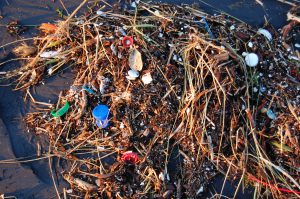
Environment
Bioplastics: Don’t let the label fool you
Doing your part as an eco-conscious consumer doesn’t end once you buy a bioplastic product
- 1626 words
- 7 minutes
Science & Tech

Researchers from McGill and Lakehead Universities are on a mission to replace the everyday single-use straw.
Mostly made of plastic, straws are on the chopping block in Canada as the country aims to ban single-use plastics by 2022. While replacements for plastic bags and packaging already exist, the most common alternative to a plastic straw is a paper one, especially in commercial establishments like restaurants.
So Theo van de Ven, Jean-Philip Lumb and Md Nur Alam got to work, designing a prototype drinking straw made from cellulose. The trio created TreeMaTech, a startup company, to form their prototype from a material they’ve dubbed ‘Cellophax.’
“The main component is cellulose, slightly modified chemically,” says van de Ven about the prototype. “Other components are a plasticizer and a food dye [for coloured straws].”
Van de Ven says one of the many benefits of cellulose straws over a paper alternative is that they don’t disintegrate when you’re trying to use them.
“Paper straws get soggy when wet,” says van de Ven. “Our straws don’t. They can even be used for hot drinks.”
The straws are both biodegradable and recyclable — they can be thrown away after use, or dissolved in an alkaline solution to make new straws or other cellulose-based products. They aren’t yet commercially available, but van de Ven says they think the straws could be made in bulk for about half a cent each.
For TreeMaTech, “the sky’s the limit,” says van de Ven, pointing to future work replacing plastics in all kinds of things, from bags and bottles to gloves and cups.
Learn more about TreeMaTech and what they’re up to with plastic replacements.
Are you passionate about Canadian geography?
You can support Canadian Geographic in 3 ways:

Environment
Doing your part as an eco-conscious consumer doesn’t end once you buy a bioplastic product

Science & Tech
Environmental entrepreneur Miranda Wang turns to science to seek profitable solutions to the problem of what to do with our mountains of plastic waste

Environment
Fast food chains, municipalities and even Ikea have recently pledged to phase out single-use plastics

Environment
Scientist Peter Ross uses all the high-tech tools of a crime scene investigator — except his crime scene is the open ocean